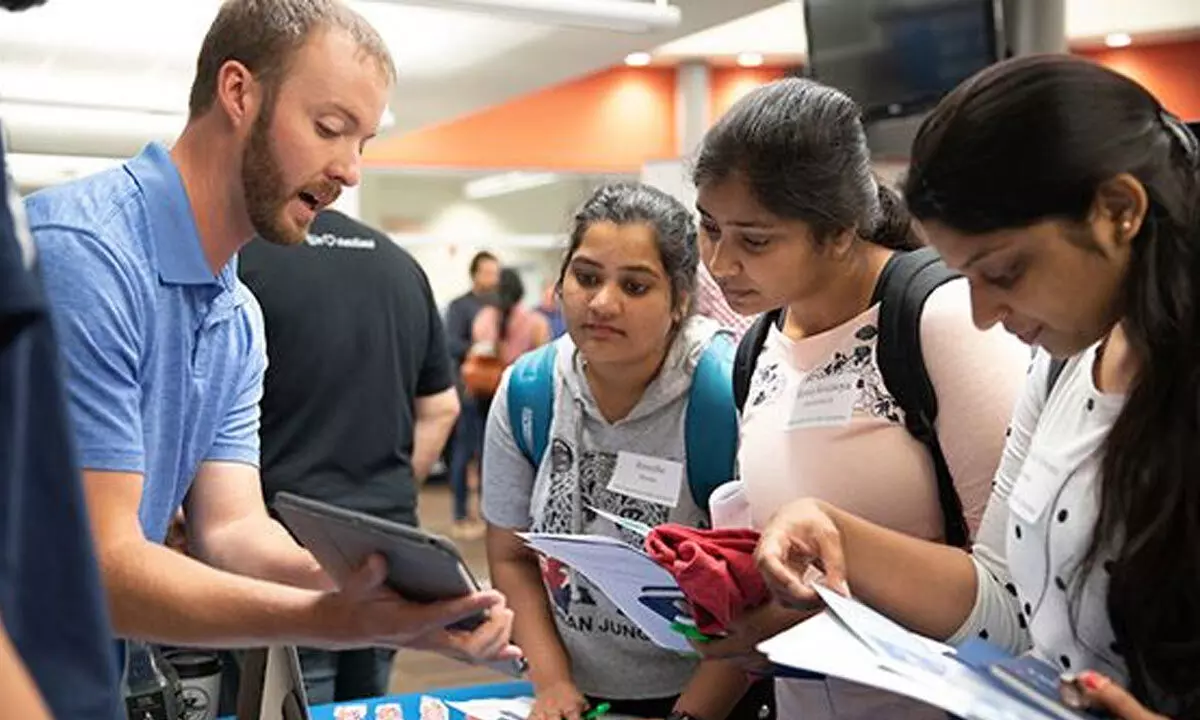Live
- Rozgar Mela a favourite programme of PM Modi: Bandi Sanjay
- Multi-stakeholder efforts needed to improve school facilities
- Be part of transforming India into Viksit Bharat: Kishan Reddy
- Now, tackle pest menace in hostels with LED lights
- Hyderabad: Students protest over appointing Physics prof as EdCET convener
- Young doctors urged to work for healthy community
- Bhavani Deeksha Viramana continues
- Sridhar Babu hardsells key sectors to Malayasia
- Health Min Damodar Raja Narsimha holds meet to improve infra in govt hosps
- Inter exam fee last date extended
Just In
Preparing career-ready students for the employers of tomorrow


Employers seek candidates who possess not only academic qualifications but also a diverse set of skills and competencies necessary for success in today’s dynamic business landscape
Employers seek candidates who possess not only academic qualifications but also a diverse set of skills and competencies necessary for success in today’s dynamic business landscape. In response, educational institutions bear the responsibility of preparing students who are job-ready for the future. Let’s explore the essential factors required to ensure that students acquire the skills and qualities that will make them highly desirable to employers in an ever-evolving job market.
Holistic education
The traditional model of education, which primarily focuses on rote learning and standardized tests,is no longer sufficient to prepare students for the complexities of the modern workforce. Instead, educational institutions should adopt a holistic approach that integrates academic knowledge with real-world skills. This includes critical thinking, problem-solving, creativity, and effective communication. Students should be encouraged to explore their interests and passions, fostering a love for learning that extends beyond the classroom.While holistic education offers numerous advantages, implementing it in traditional educational settings can be challenging. It requires a shift in the curriculum, teaching methods, and assessment strategies. Additionally, teacher training and support are essential to ensure that educators can effectively nurture the holistic development of their students.
Digital literacy
In an age dominated by technology and digital tools, students need to know digital books. This means understanding not only the use and use of software but also the ethics and responsibilities of using technology. Teachers must incorporate digital information into the curriculum to teach students to navigate the digital world safely and effectively. Digital literacy is more than a skill; It is an empowering tool that opens doors to opportunities, encourages critical thinking, and strengthens digital citizenship. As we move into the digital age, individuals, schools, and policymakers must prioritize digital literacy as an essential part of learning and development. By doing this, we can harness the full potential of technology while ensuring that all members of society navigate and work well in the digital environment safely, and fairly.
Soft Skills development
Employers value more than soft skills such as collaboration, flexibility, leadership and intelligence. Schools should create opportunities for students to develop these skills through group projects, extracurricular activities, and mentorship programs. Encouraging students to work in diverse teams and solve real-world problems can help them hone these invaluable skills. Soft skills are indispensable assets in today’s world, enhancing personal relationships, professional opportunities, and overall well-being. By recognizing their importance and actively cultivating them, individuals can not only thrive in their careers but also lead more fulfilling lives. Soft skills development is not just about acquiring skills, it’s a lifelong journey that can lead to personal growth, success, and a positive impact on the world around us. The learning process does not end with graduation. Employers are looking for candidates who are committed to lifelong learning and professional development. Schools should create opportunities for students’ development and encourage them to update their knowledge and skills throughout their careers.
Entrepreneurship and innovation
The employment landscape is evolving towards a greater emphasis on entrepreneurship and innovation. It is crucial to encourage students to think creatively, take calculated risks, and view failures as stepping stones to success. The integration of entrepreneurship programs and innovation challenges can assist students in developing an entrepreneurial mindset that is valuable in any profession. Entrepreneurship and innovation serve as the driving catalysts for progress and prosperity in our constantly changing world. They enable individuals and organizations to shape a dynamic future by addressing challenges, creating opportunities, and catalysing change. By nurturing a culture of innovation and providing ample support and resources, societies can unlock the full potential of these dynamic forces, paving the path toward a more brilliant and innovative tomorrow for everyone.
Career guidance and experiential learning
Schools should provide effective career guidance services to help students explore career opportunities, study, set goals, and make informed decisions.
Additionally, internships, co-ops, and apprenticeship programs provide students with hands-on experience and opportunities to apply classroom knowledge to real-world settings. Good business education and experiential learning are important tools to help people prepare for success and thrive in the future.
They help people make informed career choices, improve their skills, and prepare for the real world. By integrating these concepts into training and professional development, people can create a workforce that is confident, knowledgeable, and well-prepared to meet the challenges of changes in the world of work. In summary, employers are responsible for the moral and ethical behaviour of their employees. Schools should emphasize ethics, sustainability, and social responsibility in their curriculum so that students better understand their role in creating the world. Employers of the future will need individuals with a range of skills and qualifications beyond traditional academic knowledge. Schools play an important role in preparing students for work by using effective educational methods such as digital literacy, skills development, entrepreneurship, business mentoring, leadership and promoting commitment to lifelong learning and ethical responsibility. By equipping students with these essential skills, we ensure they are prepared to succeed in the changing careers of the future.
(The author is Managing Director, Oxford International Education Services)

© 2024 Hyderabad Media House Limited/The Hans India. All rights reserved. Powered by hocalwire.com






